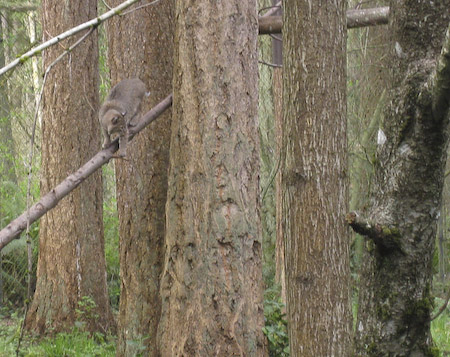|
Congratulations to all. Everyone fared equal or better to myself on this
mystery. When I saw these tracks, I thought it was a lynx, but the answer
is a large tom (ie, male) BOBCAT.

First of all, notice that the tracks are more round-looking than oval,
and there are no claw prints. In general, both of these are very strongly
suggestive of the cat family rather than the dog family. But in a powdery
snow medium, the lack of claws is more than just "suggestive" of
cat - you can basically completely rule out the dog family, as their claws
would show up very prominently in powdery snow.
There are 3 other features that indicate cat family & rule out dog
family:
- The 2 front toes and 2 side toes are "asymmetric" (i.e.
there are "lead" toes). Dog family has feet with the 2 front
toes and 2 side toes even with each other.
- The palm pad is very far forward relative to the 2 side toes. With
dog family, the palm pad is far enough back that the ridges between
the toes & palm pad tend to form an "X" shape. Cat
family does not leave an "X" shape.
- The rear edge of the palm pad has 3 distinct lobes. Dog family
displays a more straight edge.
Next, the size of the feet is WAY too big for domestic cat. Rules that
out.
Now here's where it gets interesting. The size of the feet and the
trail width are larger than what my field guides list for bobcat, but
smaller than listings for lynx or cougar. There was little to no spray (or
"explosion") of snow outside the tracks, suggesting this cat was
at a regular walking pace, and the stride of 19" is larger than what
most field guides list for walking gait for bobcat (except for Rezendes'
guide). So this makes it challenging - is it a large bobcat, a small lynx,
or an immature cougar?
Notice how crisp & full the toes & palm pad appear in the snow.
Field guides are pretty vague when it comes to lynx, but the general
opinion seems to be that lynx tracks leave smaller toe & palm pad
prints and are more indistinct & fuzzy than these tracks, due to the
copious fur on the feet. Lynx also tend to leave more hair in the tracks
than bobcat / cougar, and these tracks were clean as a whistle. So pretty
much rules out lynx.
For this to be a cougar, it would have to be fairly young to have
tracks this small, and would most likely still be with its mother. This is
a guess at best - cougars can give birth at any time of year, so the time
of year doesn't provide any clue at all as to what an immature cougar's
age might be. Anyway, photo F1 shows this cat was on its own, which
suggests it was not cougar, and leaves bobcat as the most likely option.
To be sure, I contacted bobcat expert Susan Morse of Keeping
Track Inc. in Vermont, and she confirmed it was a very large bobcat,
large enough that it could only have been a male.
Hope this was as tremendous a learning experience for you as it was for
me.
Brian
|